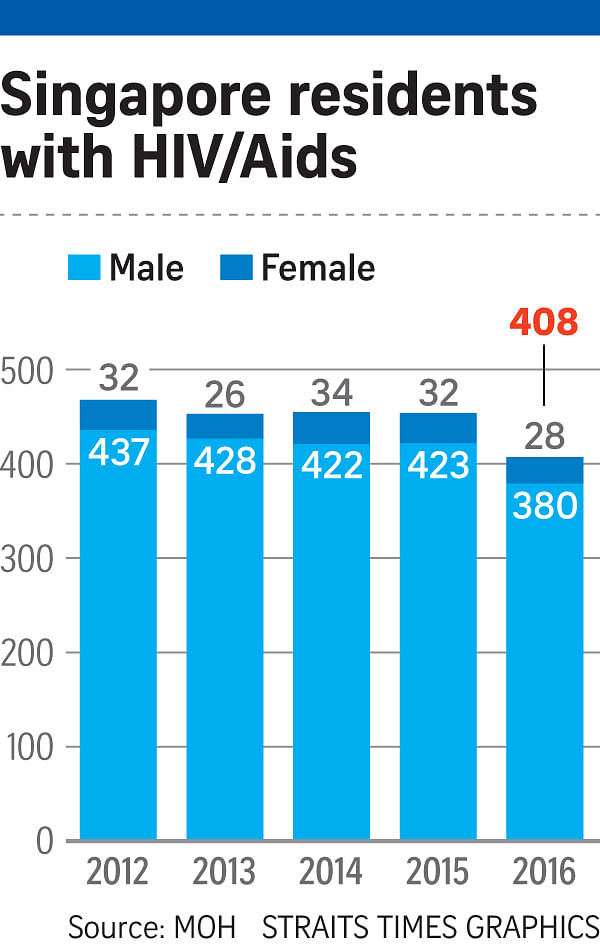The number of cases of HIV/Aids in Singapore is falling.
Last year, 408 people were diagnosed with human immunodeficiency virus (HIV) infection and acquired immune deficiency syndrome (Aids), down from 455 the previous year.
Even more heartening news from the Ministry of Health's (MOH) latest HIV/Aids report is the five-year drop in incidence per million population: From 122.8 in 2012 to 103.7 last year.
Professor Roy Chan, president of Action for Aids, said: "This is good news. It is the result of hard work and perseverance in delivering prevention information and tools to persons who are most at risk.
"We hope this trend will continue; we cannot rest on our laurels. Prevention programmes must be adequately resourced, with a long-term view. New biomedical methods of prevention should be tried out."
Dr Chia Shi-Lu, head of the Government Parliamentary Committee for Health, said: "It probably reflects a real trend as our active surveillance is quite comprehensive, so we are probably picking up most of the cases, and we also have opportunistic screening.
"It also reflects the global trend as better treatment results also reduce infectivity and transmission. But certainly we must not lose focus on continued education and prevention strategies."

Professor Leo Yee Sin, director, Institute of Infectious Diseases and Epidemiology, Tan Tock Seng Hospital, said that with universal accessibility to treatment, "the downward trend last year is encouraging and reflects years of prevention efforts".
But she added that with two in five getting diagnosed late, it "means that there is still much effort needed".
Incidence peaked in 2012, with 469 cases.
MOH, however, is less optimistic, and said that "it is too early to postulate a downward trend in the number of HIV cases". Its spokesman said it will continue surveillance to "determine the long-term trends".
The latest MOH report said that 93 per cent of patients were men. Almost two in three new patients were aged 20 to 49, and two in five had late-stage HIV infection.
It said that "sexual intercourse remains the main mode of HIV transmission", accounting for 389 of the cases. More than half were from homosexual transmissions and 36 per cent from heterosexual sex.
There is neither cure nor vaccine for this disease, which infects more than 2.5 million people worldwide each year. However, there is treatment that can slow the progression of the disease.
Last year, one in four cases was diagnosed as a result of voluntary screening, and these were mostly discovered in the early stages. The 40 per cent detected because they were sick were generally in the late stage of the disease.
Two cases were babies born with the disease. Their mothers were infected. These occurred overseas. Mothers in Singapore who test positive are treated to prevent the transmission of the virus to their babies.
Of the 7,548 people in Singapore diagnosed with the disease, 1,888 have died - 72 of them last year.

